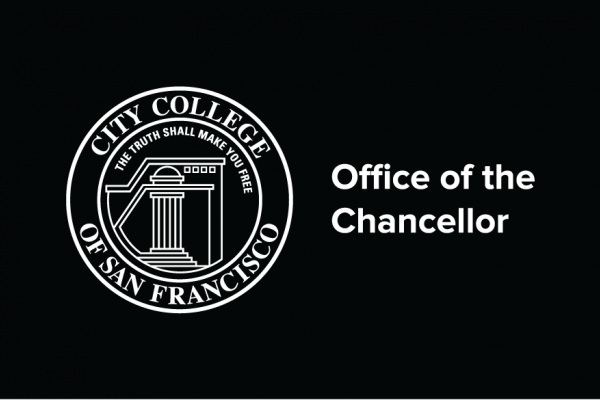
To the CCSF Community,
As you may already be aware, during the first week of November we completed our standard quarterly budgetary analysis, which was presented and discussed at the public November 7 and November 14 Board of Trustees meetings. You can view the November 7 presentation here and the November 14 presentation here.
Based on our projections, without changes to current spending levels, we would end the fiscal year with an approximate $13 million deficit and $3 million reserve deficit. We cannot allow this to happen, and are taking immediate actions to balance our budget. These changes are absolutely essential for ensuring the College can continue serving the people of San Francisco.
Tuesday, we invited constituent leaders from the Associated Student Council, SEIU 1021, Classified Senate, Academic Senate, Department Chair Council, AFT 2121 and Administrator’s Association to review the plan to reduce the deficit and preserve the 5% Reserve. The budget document presented Tuesday is attached.
As Spring Registration begins, we want to stress that throughout this process, our students remain our number one priority. We first focused on budget adjustments that would have the lowest possible impact on students. This included the following:
- STEP 1: Transfer $5.5 million in eligible Unrestricted fund (U-fund) expenses to the non-U-fund account. Accrediting bodies require all California Community Colleges to maintain a minimum 5% reserve, which makes this reallocation crucial. Result: Preservation of the College’s Reserve Fund.
- STEP 2: Reduce U-fund spending on administrators and consultants. Result: Savings of nearly $3.3M.
Even after Steps 1 and 2, we faced a remaining $2M gap, which required us to turn our attention to the Spring 2020 schedule. To prevent significant confusion amongst registering students, it was necessary to make these adjustments before the schedule goes live today. We took the following actions:
- STEP 3: Reduce the number of sections offered in the following four areas: (1) Non-credit courses; (2) Historically under-enrolled courses; (3) Non-Career Education (CT), non-General Education (GE) Credit courses; and (4) Low graduation or completion programs. Result: Savings of approximately $2.1M
- STEP 4: Reduce the summer class schedule by 25%. Result: savings of approximately $1.0M over 2 fiscal years
Even after these changes, it is important to note that no programs were eliminated.
Approximately 225 credit sections and 63 non-credit sections were removed from the Spring 2020 schedule.
- The credit subject areas most impacted were PE, Art, Dance, and Music.
- Non-credit subject areas most impacted were offerings for older adults.
We recognize that these changes are difficult, and no one at the leadership level wants to cut classes. But given the new state funding formula, the College must finally grapple with age-old operational issues. We must bring expenses in line with revenue by removing under-enrolled classes from the schedule. Only then can the College use its resources to grow enrollment and ensure the timely graduation of its students of color.
Finally, we continue to focus on additional revenue opportunities including growing enrollment, expanding CityOnline, and leveraging District real estate assets. We are grateful for your support and partnership as we work together to create a sustainable future for the College.
Thank you,
Dr. Mark Rocha Chancellor,
City College of San Francisco
